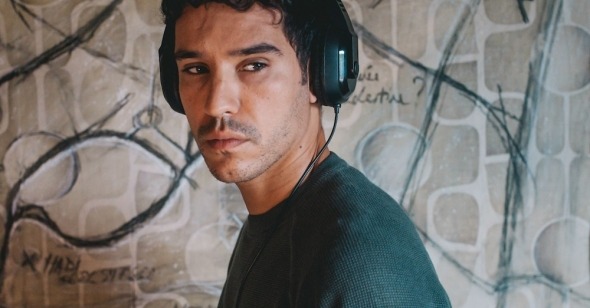Search Options
By Chris Shields
Ghost Trail
Jonathan Millet, France, Music Box Films
The protagonist in Jonathan Millet’s Ghost Trail goes by many names, among them Saleh and Amir. His real name is Hamid, but this, like his true purpose in Strasbourg, is something the viewer learns only later as Millet’s subtle and complex film unfolds. Millet and Florence Rochat’s script weaves together identity (cultural as well as personal), nationality, suspicion, loss, revenge, and justice into the strands of a tautly wound rope that vibrates with dramatic and political urgency. Millet has crafted a humanist spy thriller set amid the lingering memories of the Syrian civil war and the atrocities perpetrated by Bashar al-Assad’s regime that is both satisfyingly tense and gently hopeful.
When the film’s main action begins, it’s 2014, and Hamid (Adam Bessa), a Syrian immigrant, is working a series of menial jobs in Strasbourg. As he labors, he also searches for someone, a man (Tawfeek Barhom) he at first identifies as his cousin who might be going by the name Sami Hanna or possibly Nadim. Hamid questions his fellow Syrian émigrés, but as he soon learns, their trust is hard won due to the fear of informants working for the regime back home. With the added specter of partisan violence and terror reaching beyond Syria’s borders, Hamid’s search gains an increased sense of danger, made shockingly acute by the revelation of the person he’s really looking for.
Suddenly the film breaks from its previously established mode of patiently observed dramatic realism and a digitally rendered soldier moves through a video game environment. It’s a seemingly banal interpretation of military action set in what is presumably the Middle East. As the video game soldier moves through doorways firing its fake machine gun, securing the fake perimeter of a fake location in a fake conflict, softly modulated voices discuss something of real importance. The video game device packs a strong critical punch, juxtaposing the simulated war-based entertainment enjoyed by millions from the comfort and safety of their couches with the work of a clandestine group engaged in a life and death operation. A group, of which Hamid is a member, dedicated to finding and punishing Syrian war criminals, is holding a meeting using the in-game chat function. Hamid, it turns out, is not looking for his cousin but a member of Assad’s regime who subjected him to interrogation and torture while he was imprisoned. The criminal’s current identity is unclear, as is his location. The group might have a lead on him in Hamburg, but Hamid has a strong intuition that he’s found him, a chemical engineer named Harfaz, in Strasbourg.
Hamid pursues his target, and from here Ghost Trail shifts from a delicately rendered drama about the life of a refugee to a white-knuckled game of cat-and-mouse driven by questions of revenge and tempered by the pain of mourning. As Hamid is fed audio testimonies from witnesses who were also tortured by Harfaz in order to verify his identity, he’s forced to relive his own traumatic past. At the same time, he tries to remain in Strasbourg, and the only way to achieve this, and continue his hunt, is by undergoing a psychological evaluation in which he acknowledges the violent deaths of his daughter and wife in a gas attack. The action and the conflict in Millet’s film shifts between the internal and external in a particularly satisfying and resonant way with each informing the other—Hamid's personal struggle motivating and complicating his efforts to find Harfaz and bring him to justice.
This complex dance of character and plot is made possible by Bessa’s performance. At times his stoic languor and calculated reticence give way to overwhelmed emotion as he gazes at photos of the people he has lost, but Bessa’s detailed and understated work pushes into necessary catharsis. His performance is balanced by that of his target, Barhom as the sinister and charismatic Harfaz, whose pragmatic, forward-looking (i.e. past-disavowing) survivalism runs counter to Hamid’s need for closure.
In an anxiety-inducing, chess match-like scene, Hamid ends up face-to-face with his enemy who offers him an open seat at lunch. The two men sniff each other out, Harfaz to see where Hamid’s political allegiance lies, and Hamid fishing for confirmation that this is the man he’s after. Millet’s film never shows its hand, and we leave the scene with a degree of uncertainty about who knows what. But something else important is established here as well: two perspectives on conflict. Harfaz is a chemical engineer who joined ranks with Assad’s regime for political reasons, making a certain moral calculus involving cruelty, death, and dehumanization acceptable to him. Hamid, however, was a professor of literature, someone for whom life and beauty have a perhaps greater value.
Between these two men Millet draws a rich matrix of values that share a few intersections—which the director expresses by having Hamid recount some of Harfaz’s activities as his own to his mother on a video call as evidence that he’s moving on with his life—but many more divergences. It’s Hamid who quotes Saleh Diab’s poem “Embroidery,” saying: “What can we do/underneath a foreign sky/but listen to forgetfulness/as it embroiders our lives/like lace.” Yet we understand only later when the two men meet, that he is speaking Harfaz’s truth. Hamid must bring his torturer to justice, as only then can he move on. But what becomes of greater importance is the way this justice is enacted, not by murder, as Harfaz would do, but by bringing him to trial. Herein lies the hope in Ghost Trail, a rigorous portrait of grief and acceptance that contains the broken and perhaps mended heart of a political thriller.
